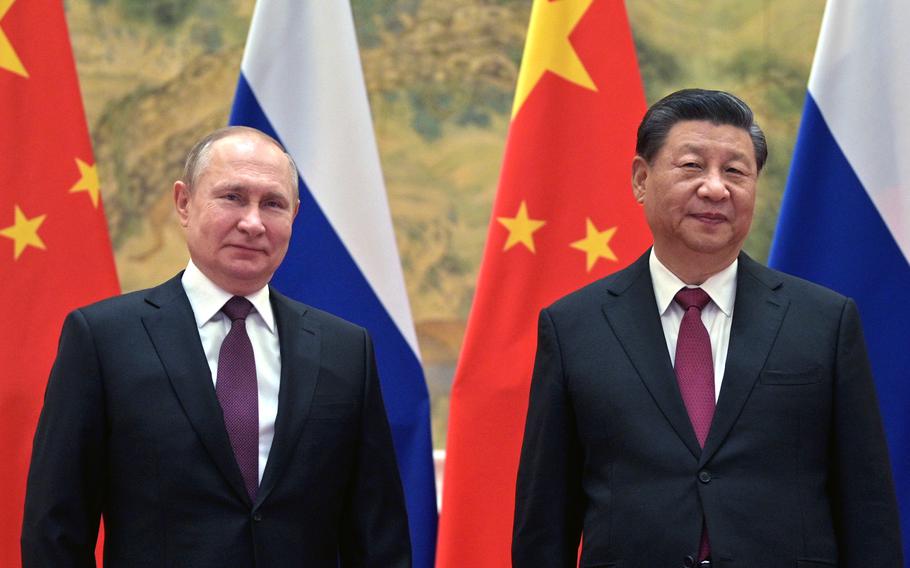
Chinese President Xi Jinping, right, and Russian President Vladimir Putin pose for a photo prior to their talks in Beijing, China, Friday, Feb. 4, 2022. Putin on Friday arrived in Beijing for the opening of the Winter Olympic Games and talks with his Chinese counterpart Xi Jinping, as the two leaders look to project themselves as a counterweight to the U.S. and its allies. (Alexei Druzhinin, Sputnik, Kremlin Pool Photo via AP)
Lithuania’s top diplomat called on the world to stand up to China and Russia’s alleged human rights violations during a visit to Australia, while acknowledging there would be a “cost” to taking such actions.
Foreign Minister Gabrielius Landsbergis told the National Press Club in Canberra that countries need to cut their trade and energy dependency on what he described as “global order disruptors.” There is a need to strengthen partnerships “between liberal democracies that build and maintain the rules-based world order,” he said.
Lithuania faced unofficial trade barriers and a downgrade of diplomatic ties with China after it allowed Taiwan to open a representative office in its capital, a move Beijing deemed a violation of its one-China principle. Earlier this week, China officially halted imports of Lithuanian beef in what appears to be a largely symbolic move.
Landsbergis’s speech comes one day before a meeting of the Quad foreign ministers in Melbourne, a security partnership made up of Australia, Japan, India and the U.S. The countries are expected to discuss cybersecurity and territorial issues as part of the group’s wider focus on countering the military rise of China, although Russia’s military build up on the boarder with Ukraine may well come up.
President Vladimir Putin has repeatedly denied that Russia plans to attack Ukraine and criticized a buildup of NATO forces near his country’s frontiers.
When asked about the world’s “lack of concrete responses” to the tensions on the Ukraine border and claims of widespread human rights abuses in China’s Xinjiang region, Landsbergis said the answer was for people to not “be silent” on the issues.
“There are people who would want that the problems would not be talked about,” he said. The only way to change it was to keep “raising the issues,” he added.
Removing forced labor from the supply chain will increase the price of consumer goods, Landsbergis said. “Do not expect that when we solve them they will be for free. There will be a price for everybody to pay,” he said. “These things do cost, but principles cost.”
Beijing has denied allegations of human rights abuses and forced labor in Xinjiang, criticizing other countries like France, U.K., Canada and most recently Japan for passing parliamentary resolutions on the matter.
China’s Foreign Ministry Spokesman Zhao Lijian said Lithuania should reflect on its own human rights record instead of ganging up with other countries. “What Lithuania should do is to face up to facts, redress its own mistake, and come back to the right track of adhering to the One China principle,” he said in a briefing on Thursday.
Landsbergis, who is in Australia to open a new Lithuanian embassy, said he “wouldn’t be surprised” if other countries followed his in moving toward increasing their diplomatic ties with Taiwan. “I don’t think Lithuania is alone in this,” he said.